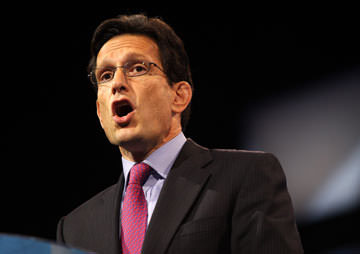Overdosing on Tea
The Republican Party's reliance on tea party support is like an addict's dependence on a dangerous drug: It may feel good at first, but eventually it eats you alive. House Majority Leader Eric Cantor has been defeated in a primary battle with little-known tea party candidate Dave Brat, an unthinkable loss that reveals deep rifts within the GOP. Gage Skidmore (CC-BY-SA)
House Majority Leader Eric Cantor has been defeated in a primary battle with little-known tea party candidate Dave Brat, an unthinkable loss that reveals deep rifts within the GOP. Gage Skidmore (CC-BY-SA)
The Republican Party’s reliance on tea party support is like an addict’s dependence on a dangerous drug: It may feel good at first, but eventually it eats you alive.
No House majority leader had ever been ousted in a primary before Eric Cantor’s shocking defeat on Tuesday. Republicans who tell themselves it was Cantor’s own fault — he lost touch with his Virginia district, he tried to have it both ways on immigration, he came to be seen as part of the Washington establishment — are whistling past the graveyard.
Cantor didn’t just lose, he got clobbered. His opponent, college professor Dave Brat, spent just $200,000 on the race — not much more than Cantor’s $5 million campaign spent on meals at steakhouses. Yet a powerful incumbent, running in a district whose boundaries were custom-designed for his benefit, lost by an incredible 11 percentage points.
There can be no doubt that the tail is now wagging the dog. The tea party should no longer be thought of as just a faction of the GOP. It’s calling the shots.
Certainly, other Republican incumbents have managed to survive this primary season, with the possible exception of Sen. Thad Cochran of Mississippi, who is thought likely to lose a runoff against tea party-backed challenger Chris McDaniel. But many establishment Republicans hung on by claiming the tea party’s radical vision as their own.
And what is that vision? An unimaginable reduction in the size and role of government that would reshape the nation in ways most Americans would never accept.
Look at Brat, for example. He has views that are appropriate for academia — he teaches economics at Randolph-Macon College — but would be disastrous if put into practice. He is reportedly a devotee of the writings of novelist Ayn Rand, whose worship of unfettered capitalism was matched only by her loathing of government, taxation and anything resembling a social compact.
I believe many people would agree with Brat’s excoriation of the “crooks up on Wall Street” who escaped punishment after their recklessness caused the 2008 financial meltdown. Some have described him as an economic populist stance, but I wonder if the description fits.
When NBC’s Chuck Todd asked about the minimum wage, Brat responded that “you cannot artificially make up wage rates.” So is this a debate most Americans are ready to have? Not whether the minimum wage should be raised, but whether it should exist?
Brat believes in fiscal restraint, which is a standard Republican position — until it veers into nihilistic territory such as refusing to raise the debt ceiling, as most tea party Republicans in the House have consistently voted. He questions the federal role in setting education policy — at a time when U.S. schools, by almost any measure, are falling behind.
Brat also opposes comprehensive immigration reform that could provide a path to citizenship for the more than 11 million men, women and children who are here without papers. This is the issue that brought conservative radio talk show hosts Laura Ingraham and Mark Levin to endorse and campaign for him.
Cantor told voters that he, too, opposed “amnesty” for undocumented immigrants. But he was seen as “soft” on the issue, which should be translated as “in touch with reality.” Republican intransigence on reform threatens to make Latinos — the biggest minority group in the nation — a longtime loyal constituency of the Democratic Party. If this happens, simple arithmetic makes it hard to imagine how Republicans will be able to compete in national elections.
In other words, the tea party is pushing the GOP toward ideological purity and electoral marginalization. Smart Republicans don’t want to walk off the cliff. But deviating from the tea party path, as Cantor did, can mean being sent home.
The fascinating thing about Brat’s victory is that it came without much support from national tea party leaders, who declined to invest in him because they believed he couldn’t win. This was a grass-roots defenestration, performed without adult supervision. The standard way of dealing with an insurgent movement — find a way to co-opt its leaders — won’t work if there are no effective leaders.
The GOP has to decide whether it intends to participate responsibly in the enterprise of government or stand on the sidelines, shouting invective and throwing stones. One of which just hit the majority leader of the House of Representatives in the head.
Eugene Robinson’s e-mail address is eugenerobinson(at)washpost.com.
© 2014, Washington Post Writers Group
Your support matters…Independent journalism is under threat and overshadowed by heavily funded mainstream media.
You can help level the playing field. Become a member.
Your tax-deductible contribution keeps us digging beneath the headlines to give you thought-provoking, investigative reporting and analysis that unearths what's really happening- without compromise.
Give today to support our courageous, independent journalists.



You need to be a supporter to comment.
There are currently no responses to this article.
Be the first to respond.